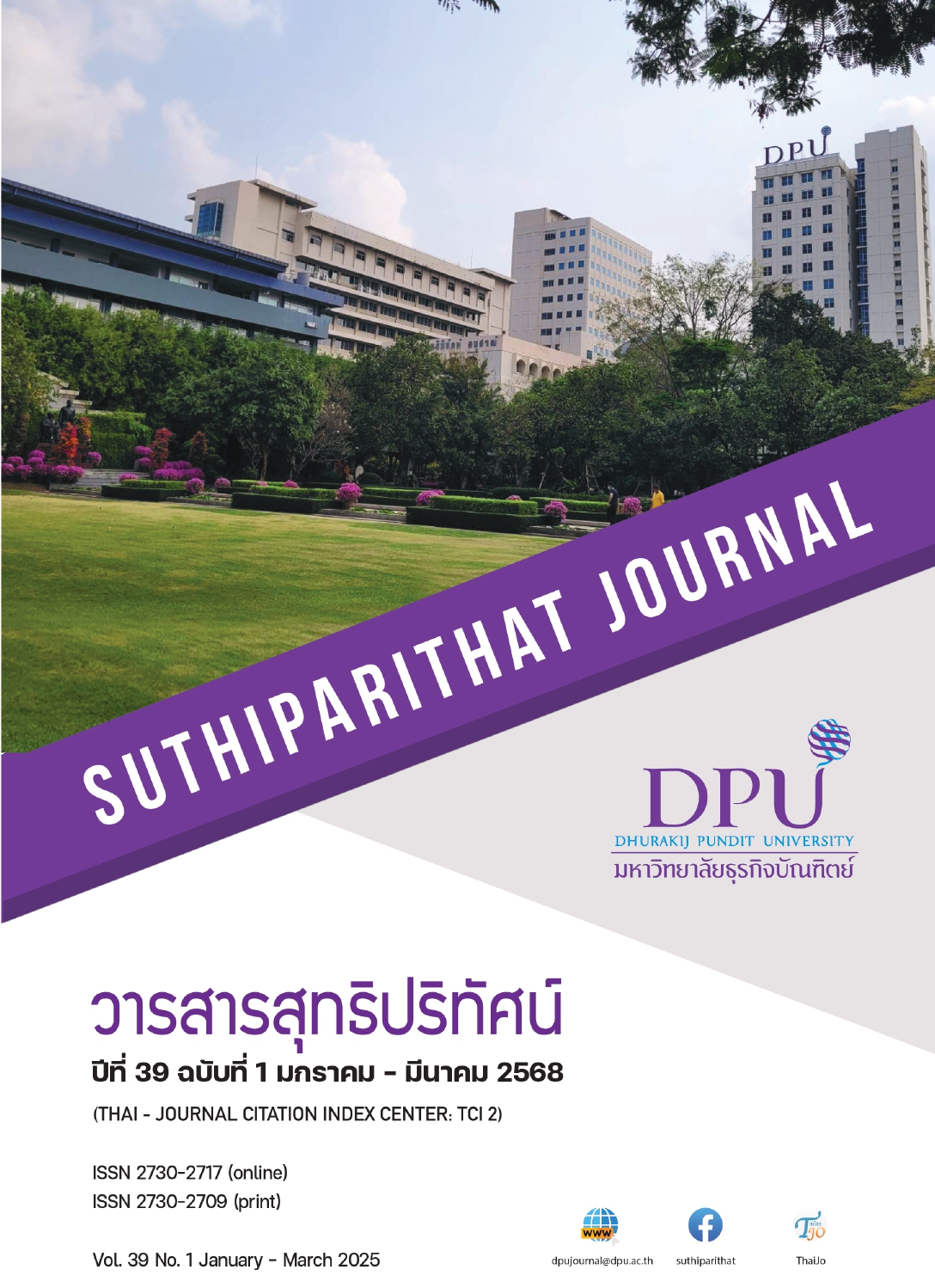Factors that influence the growth of Thailand’s car industry
Keywords:
Car Production Industry, Car Production Volume, Automotive Industry-Labor Productivity Index, ThailandAbstract
The purpose of this research was to study the factors influencing the car industry and the production volume of Thailand’s car production industry. The information used in this study includes variables from using of Thailand’s car production industry. This research uses a monthly time series of secondary data from January 2017 to December 2023, a total of 84 months. The data were also analyzed by multiple regression analysis with coefficients tested at a significance level of 0.05
The results showed that export car sales volume, domestic car sales volume, capital goods import, automotive industry labor productivity index and economic stimulus policy 2019 factors had an influencing or positive relationship with Thailand’s car production industry. The electric vehicle promotion policy 2022 factors had an influencing or negative relationship with Thailand’s car production industry. Every factor could explain the overall relationship at 70.3%, while the private investment index, exchange rate, crude oil price, policy to promote the production and use of electric vehicle factors had no significance relationship with Thailand’s car production industry. The result can be used as a guideline for planning to support the future changes in the car industry.
References
กองวิจัยเศรษฐกิจอุตสาหกรรม. (2565). ความท้าทายของการส่งออกชิ้นส่วนยานยนต์ไทยในอนาคต. https://www.oie.go.th/assets/portals/1/fileups/2/files/ArticlesAnalysis/Challenges_Exporting_AutoParts_Future.pdf
ค่าเงินบาทแข็ง VS ค่าเงินบาทอ่อน ใครได้ ใครเสีย? (2567). ธนาคารแห่งประเทศไทย. https://www.bot.or.th/th/research-and-publications/articles-and-publications/bot-magazine/256601131vocabstoryfx.html
ณัฐธิญา ราชธิสาร และวีณา ลีลาประเสริฐศิลป์. (2564). ปัจจัยที่เป็นตัวกำหนดการเจริญเติบโตทางด้านเศรษฐกิจของประเทศไทย. http://www2.huso.tsu.ac.th/NCOM/husoicon2021/fullPDF/202115133725-462.pdf
ดิษฐวัฒน์ พรรณประสาทน์ และปณัทพร เรืองเชิงชุม. (2562). การเพิ่มผลิตภาพแรงงานด้วยการลดความสูญเปล่าในกระบวนการล้างรถ กรณีศึกษาธุรกิจคาร์แคร์ จังหวัดกาฬสินธุ์. วารสารวิทยาการจัดการ มหาวิทยาลัยสงขลานครินทร์, 36(2), 113-139. https://so03.tci-thaijo.org/index.php/jms_psu/article/view/189840
ธนันรัตน์ พวงนุ่ม. (2549). ปัจจัยกำหนดปริมาณการส่งออกยางพาราของไทยไปประเทศจีน [สารนิพนธ์ปริญญามหาบัณฑิต, มหาวิทยาลัยรามคำแหง]. ThaiLIS Digital Collection. https://tdc.thailis.or.th/tdc/dccheck.php?Int_code=53&RecId=7077&obj_id=54632&showmenu=no
ธนาคารแห่งประเทศไทย. (2567). รายงานนโยบายการเงิน ไตรมาสที่ 4 ปี 2567. https://www.bot.or.th/content/dam/bot/documents/th/our-roles/monetary-policy/mpc-publication/monetary-policy-report/MPR_2567_Q4.pdf
นเรศ กิจจาพัฒนพันธ์. (2560). การคาดการณ์ GDP ภาคอุตสาหกรรม. กองวิจัยเศรษฐกิจอุตสาหกรรม. https://www.oie.go.th/assets/portals/1/fileups/2/files/ArticlesAnalysis/Industrial_GDP_Forecast.pdf
ปริวัฒน์ ช่างคิด. (2562). เอกสารประกอบการเรียนวิชา: ความรู้เบื้องต้นเกี่ยวกับนโยบายสาธารณะ. วิทยาลัยชุมชนระนอง.
ผกามาศ คั่งฆะ. (2562). ปัจจัยที่มีผลกระทบต่อมูลค่าการส่งออกรถยนต์พิกัด (H8704) จากประเทศไทยไปออสเตรเลีย [การศึกษาค้นคว้าอิสระปริญญามหาบัณฑิต, มหาวิทยาลัยหอการค้าไทย]. สำนักหอสมุดกลาง มหาวิทยาลัยหอการค้าไทย. https://searchlib.utcc.ac.th/library/onlinethesis/309450.pdf
พิชัย ถีระมัด. (2567). ตัวกำหนดการเติบโตทางด้านอุตสาหกรรมการผลิตเหล็กสำเร็จรูปของประเทศไทย [การค้นคว้าอิสระปริญญามหาบัณฑิต, มหาวิทยาลัยเทคโนโลยีราชมงคลตะวันออก]. มหาวิทยาลัยเทคโนโลยีราชมงคลตะวันออก.
มนณิกา ลิ้มธนากุล. (2563). ปัจจัยต่อการพัฒนาเศรษฐกิจของสิงคโปร์: คำอธิบายผ่านตัวแบบรัฐพัฒนา [สารนิพนธ์ปริญญามหาบัณฑิต, จุฬาลงกรณ์มหาวิทยาลัย]. Chula ETD. https://digital.car.chula.ac.th/chulaetd/7357/
วิระยา ทองเสือ. (2566). ส่องทิศทางอุตสาหกรรมชิ้นส่วนยานยนต์ไทยปี 2566-2567. https://krungthai.com/Download/economyresources/EconomyResourcesDownload_1918Research_Note_Auto_Part_20_03_66.pdf
ศุภวัฒน์ โชคสวัสดิ์ไพศาล. (2567). แนวโน้มธุรกิจ/อุตสาหกรรม ปี 2567-2569: อุตสาหกรรมรถยนต์ไฟฟ้า. ธนาคารกรุงศรีอยุธยา จำกัด (มหาชน). https://www.krungsri.com/th/research/industry/industry-outlook/hi-tech-industries/electric-vehicle/io/electric-vehicle-2024
สกุล ศุภมาร์คภัคดี. (2562). ปัจจัยที่มีผลต่อมูลค่าการส่งออกรถยนต์ของประเทศไทยไปยังประเทศออสเตรเลีย [การศึกษาค้นคว้าอิสระปริญญามหาบัณฑิต, มหาวิทยาลัยหอการค้าไทย]. สำนักหอสมุดกลาง มหาวิทยาลัยหอการค้าไทย. https://searchlib.utcc.ac.th/library/onlinethesis/309264.pdf
สถาบันยานยนต์. (2562). ศูนย์สารสนเทศยานยนต์. https://data.thaiauto.or.th
สถาบันยานยนต์. (2565). การศึกษาการเปลี่ยนผ่านห่วงโซ่อุปทานไปสู่อุตสาหกรรมยานยนต์สมัยใหม่. https://data.thaiauto.or.th/auto/articles-th/auto-articles-th/10488-การศึกษาการเปลี่ยนผ่านห่วงโซ่อุปทานไปสู่อุตสาหกรรมยานยนต์สมัยใหม่.html
สมบัติ ท้ายเรือคำ. (2545). การวิเคราะห์การถดถอยพหุคูณ (MRA) การวิเคราะห์เส้นทาง (PA) และการวิเคราะห์องค์ประกอบ (FA). การวัดผลการศึกษา มหาวิทยาลัยมหาสารคาม, 8, 37-46. https://so02.tci-thaijo.org/index.php/jemmsu/article/view/154728
สรัลพร เดชรัตนวิไชย. (2562). การลงทุนโดยตรงจากต่างประเทศและการแพร่กระจายผลิตภาพการผลิตในอุตสาหกรรมยานยนต์ของประเทศไทย [วิทยานิพนธ์ปริญญามหาบัณฑิต, จุฬาลงกรณ์มหาวิทยาลัย]. Chula ETD. https://digital.car.chula.ac.th/chulaetd/9020/
สำนักงานปลัดกระทรวงพาณิชย์, ศูนย์เทคโนโลยีสารสนเทศและการสื่อสาร. (2567). รายงานข้อมูลสถิติการค้าระหว่างประเทศของไทย. https://tradereport.moc.go.th/th/stat/reportmonth03
เสาวณี จันทะพงษ์ และอโนมา พุทธารี (2566). ไทยจะอยู่ในห่วงโซ่อุปทานโลกหลังโควิด 19 และปัญหาภูมิรัฐศาสตร์ได้อย่างไร วิเคราะห์จากมุมมองการนำเข้าสินค้าทุน: ตอน 1. ธนาคารแห่งประเทศไทย. https://www.bot.or.th/th/research-and-publications/articles-and-publications/articles/Article_10Apr2023.html
อรรถพล สืบพงศกร และปีรติ อ่องสุรักษ์. (2557). การศึกษาปัจจัยที่มีอิทธิพลต่ออุปสงค์รถยนต์และการพยากรณ์อุปสงค์รถยนต์ในประเทศไทย: กรณีศึกษา กลุ่มตลาดรถยนต์นั่งขนาดเล็กและกลุ่มตลาดรถยนต์นั่งกึ่งบรรทุก. วารสารเศรษฐศาสตร์ มหาวิทยาลัยเชียงใหม่, 18(2), 27-70. https://so01.tci-thaijo.org/index.php/CMJE/article/view/60986
ttb analytics ห่วงอุตสาหกรรมยานยนต์ไทยกำลังเจอปัญหาเชิงโครงสร้างรุนแรงสุดในรอบหลายสิบปี. (2567, 22 มีนาคม). ธนาคารทหารไทยธนชาต จำกัด (มหาชน). https://www.ttbbank.com/th/newsroom/detail/ttba-thai-automotive-industry-2024
Chowdhury, S. G., & Chatterjee, S. (2020). Determinants of Indian automobile industry growth. Eurasian Journal of Business and Economics, 13(26), 65-91. https://doi.org/10.17015/ejbe.2020.026.04
Manh, P. H., Lam, H. X., Kien, T. T., & Ha, N. T. T. (2022). Investment & economic growth: A nexus between domestic investment and foreign direct investment in Vietnam. International Journal of Economics and Finance Studies, 14(4), 1-18. https://doi.org/10.34109/ijefs.20220101
Downloads
Published
How to Cite
Issue
Section
License
Copyright (c) 2025 Dhurakij Pundit University

This work is licensed under a Creative Commons Attribution-NonCommercial-NoDerivatives 4.0 International License.
Content and information of the article published at Suthiparithat Journal are based on the sole opinions and responsibility of author(s) only. Neither the editorial board involve in......







